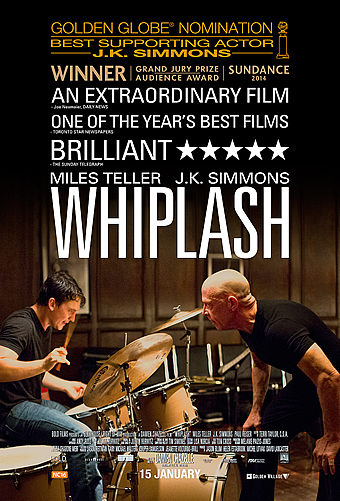Damien Chazelle’s ‘Whiplash’ questions the morality of the actions depicted by the characters in the film, but the argument can be made that these actions are justified and for a better purpose. The film does this in such a way that has the viewer constantly evaluating their opinion, but with that it also leaves it to the viewer to decide whether the actions performed were right or wrong.
The film starts with a young drummer named Andrew Neiman who aspires to be the best, but his aspirations a re truly tested when he is introduced to the Terence Fletcher, whose qualities resemble that of a drill sergeant. Andrew learns this the hard way when he witnesses first hand the very unorthodox and hurtful methods that Fletcher uses to bring the best out of people musically. This is where the underlying conflict lies throughout the entire film.
re truly tested when he is introduced to the Terence Fletcher, whose qualities resemble that of a drill sergeant. Andrew learns this the hard way when he witnesses first hand the very unorthodox and hurtful methods that Fletcher uses to bring the best out of people musically. This is where the underlying conflict lies throughout the entire film.
Watching the film initially, it is easy to form an opinion that Fletcher is just some hot-head music conductor with no regard for the success of his students, but through his actions and the dialogue he makes in the movie, his true motives are eventually made clear. The film asks the question, how far is too far? We see that when it comes to Fletcher, you can’t go to far and I believe he is right.
It is clear that Fletcher is very unorthodox in how he manages his students, but upon further inspection, it is clear that it is a mask he wears because of the passion he has for the music. He is only tough and hard when he needs to be to bring out the best in people and to weed out those who do not share the same passion as he does. He believes that in order to bring out the best in people, you have to find ways to truly motivate them to become the best that they can be and one of the best ways to do that is to get in their head so that they are forced to prove you wrong.